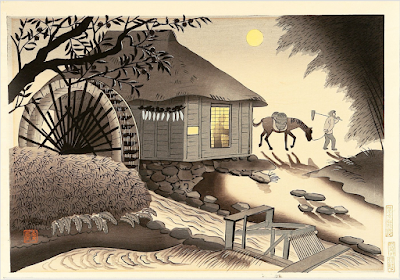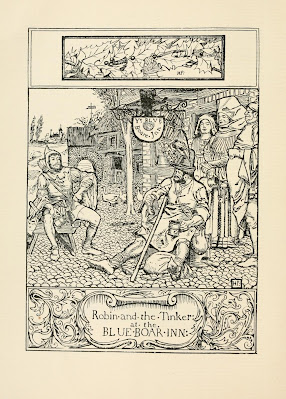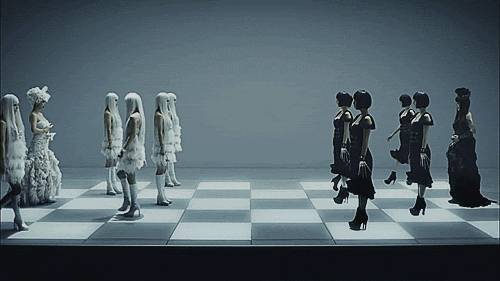Present were: Nicole, Paul,
Gary, Dan, Raph, Mike as tellers; Maddie, Janet, Juliet as listeners;
and Jane as anecdoteuse.
Raph began with a version of
The Wizard’s Apprentice,
which started with the sale of a Hebridean crofter’s
useless son to a stranger in a boat for £20, a bargain renewed for a
couple of years at the same rate, but after three years the stranger
did not reappear with the boy... and his parents’
concern for him should be taken as emotional, rather than financial,
since the father sets off to look for him... and eventually his son,
much older, finds him, near the castle where he, the son, is one of
the Wizard’s twelve apprentices,
but anxious to escape and strike out on his own,
so he tells his father that he will be the dove with a broken
tail-feather when the Wizard offers him a bargain for hospitality.
(This is usually the kind of way the lad knows his beloved from the
rest of the wizard’s
daughters...)
Once
the lad has escaped, he and his father make money by selling the
transformed lad as a dog, as a bull, and finally as a horse for
exponentially increasing sums of money, always with the proviso that
the golden collar, the golden nose-ring and the golden bridle should
be retained, out of which, when thrown on to a green hillock, the lad
will re-emerge. However, as the lad knows, the purchaser on each
occasion (though disguised) is the Wizard, who doesn’t
want to let his best apprentice escape, and when he buys the horse he
jumps on its back, snatches the bridle from the father’s
hands and rides off.
Reaching
the castle, in whose courtyard his intellectually challenged
daughters are heating water in a giant cauldron, the
Wizard tells
them to boil the horse till it’s
dead, but the horse (whom they know to be the number one apprentice)
persuades them that hot water cannot harm someone who is magically
transformed, so they go off to get cold water to fill the cauldron
and drown him, giving him the chance to rub the bridle off against a
wall, run out of the castle and hide as a trout in a stream –
however, the lady of the
manor tickles him out and puts him in her apron, though when she gets
home she finds a gold ring in her apron instead of a fish.
At
that very moment, The Wizard, his eleven remaining apprentices and
three daughters arrive, pretend to be tinkers and servants, offer to
do work for her and demand, as payment, the gold ring, which she
refuses, at first, to hand over, but when she changes her mind it
leaps from her finger into the ashes in the fireplace, where
the hunters are about to find it, when it becomes a pea, and jumps
into a sack of peas, so the hunters change into doves, to peck
through the peas, but the pea turns into a fox and eats them all UP!
After
which, father and son go home to the Hebrides…
[At
this point, there was a lengthy discussion of the physics of
transformation, where the extra matter involved came from or went to
in lad>bull or lad>pea. Other dimensions were suggested, like a
hall of luggage-lockers, where each wizard deposited the relevant
material till it was needed, but Mike trumped this with the proposal
that the Dark Matter (which we know exists, but can’t find) is the
source and repository, thereby explaining Magic and solving a major
problem in physics. We wait for the Nobel Prize.]
Nicole
painted an endless war, from which three hungry, nay, hangry
soldiers, Wilhelm, Benek and Andrek intend to desert by hiding in the
cornfield while the rest of the army simply moves off. Only they
don’t. Not that day, nor the next, nor the next… The Great Dragon
spots them, offers them seven years’ worth of inexhaustible sacks
of gold, in return for seven years of service to him, renewable for
an unspecified period… Andrek (the kind of man who DOESN’T accept
cookies) quibbles, so the Dragon concedes the standard three-riddle
get-out before he takes them into his service.
As
the day approaches, and they return to their rendezvous in the
cornfield, it is only Andrek who responds courteously to an old
woman’s question about why they look so worried… he can see that
she is really Ježibaba, and because he is nice to her she sends him
to the Great Dragon’s Granny, who is fed up with her grandson’s
bossy ways – not least the way in which he turns up and demands to
be fed! So, over lunch, with Andrek hidden and listening, she quizzes
him on the riddles he is planning to ask, playing Silly Old Granny to
let him play Clever Young Grandson.
A
nice touch at the end, as the three soldiers are able to go off with
their sacks of endless gold, having answered the riddles, is that
Andrek reveals the source of their knowledge, and tells the Great
Dragon just what his Granny thinks of him!
Paul
told The Glass Cabinet (beautifully
embroidered with
wheelbarrows and cobblestones)
from Terry Jones’ Fairy
Tales, which emphasised that you can’t get something for nothing
without a great explosion at the end, because the Cabinet always
required that something be put into it that was equivalent to what it
so magically provided.
Mike’s
story, The Cap that Bought the Drinks, from page 28 of Volume 2 of
the Dictionary of British Folk-Tales in the English Language,
recounted a carefully prepared scam, in which the con-man made it
appear that the possession of a particular cap guaranteed free
drinks… and auctioned the cap at the end of an evening during which
he had demonstrated its powers, making a considerable profit on the
sums he had previously invested in the pubs concerned before ever
taking his marks into them. Speculate, to accumulate, that’s the
motto! (But also caveat emptor – and, at the bottom of any
estimate, e. & o. e.)
Dan’s
sad story dealt with the price of love, you might say. Once, the wolf
had a lovely voice, when she sang in the moonlight, and a young
prince was so taken with it that he camped out in the woods night
after night to hear it, and even applauded… which bound the wolf
even more closely to him, though she
knew that if he saw her, and didn’t just hear her, he would be
repelled, so she always retreated after she heard the applause.
However, one night, the prince wanted to see where the voice came
from and, thinking the noise he made by applauding, must be
frightening the singer away, he climbed up the hill silently. When
she saw him so close, she put out her paw to prevent him seeing her,
but she forgot her lupine nature, and her claws ripped out his eyes.
The
blinded prince was excluded from the royal succession and locked
away. The wolf, who had dreamed of being transformed into a human
being and becoming his wife, went to a witch who promised to restore
the prince’s sight. She put a spell on the wolf that would let her
seem human, except in bright light, and the wolf went off and
succeeded in rescuing the prince from his prison and bringing him
back to the witch, whose potion gave him back his eyes. The price for
this is the wolf’s beautiful voice. As she leads the sighted prince
away from the witch’s hut, confident that he will marry the woman
who has made him see again, the wind blows the clouds away from the
moon. He sees her – the hand he holds is revealed, even to his
touch, as a paw with claws, and he pulls free and runs away.
And
that is why wolves howl now, when the moon is full.
Gary
gave us a cheerier conclusion, with the tale of Cadedd who sets off
to find his father, who had gone in search of the North Wind. On his
way, he passes an inn with an unfriendly and exploitative landlord,
but, in the next valley, on his way to the summit, he finds a spring
with stones placed around it, and a willow-grove from which a voice
speaks to him, urging him to go to an ancient stone hut at the peak,
where Llwyd Hen, a wise man, known as the North Wind, had once lived,
and to bring back a rag which, when struck with a willow wand, will
provide food.
Cadedd,
on his return, stays at the inn and tells the tale of what he has
done, and demonstrates the rag. But when he gets back to his family,
the rag has lost its properties.
He
sets off again, and the voice from the willow-trees advises him to
take the goatskin from the hut,
since gold coins will pour from its ear. Again, the foolish boy stays
at the inn and relates what has befallen him. Again, the magic of the
skin fails at home.
On
his third journey, the voice in the trees tells him how the
inn-keeper has robbed and cheated him, and urges him to take the
cudgel from the hut, which will hit whoever he tells it to for as
long as he wants. The voice also says that his father will protect
him and be with him, though not in bodily form. Cadedd uses the
cudgel to regain the real rag and the real goatskin from the
inn-keeper and goes home – but the inn-keeper, to have his revenge,
tells the local king, a war-lord, about the two magic gifts (though
not about the cudgel) and the war-lord goes to call on Cadedd with
his war-band of archers. Though the war-lord snatches the gifts, the
cudgel sets about him, so that he is forced to drop them, and the
archers’ arrows, that might have spelt death to Cadedd, are
diverted by the North Wind, and turned back against them.
The
frustrated war-lord goes back to the inn-keeper, to ask why he had
not mentioned the cudgel, and, not receiving a satisfactory answer,
hangs him. Being already half-way there, he and his war-band
continued to Llwyd Hen’s stone hut, to search it for further
magical objects or things of value, but a terrible storm springs up,
and they shelter within it, until a mighty bolt of lightning shatters
it, and when the dust has settled and the North Wind calmed down
there stand fourteen stones in a circle, one for the King and each
member of his war-band. And there they stand to this day.
After
which, as a closer, Mike
reminded us of the ultimate fate of acquisitiveness and the pursuit
of profit, with the story of
The Magic Cask, which you can read here:





















